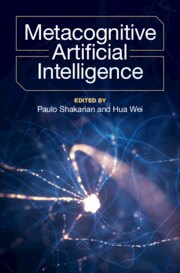Book contents
- Frontmatter
- Contents
- Contributors
- Acknowledgments
- Part I Introduction
- Part II Taxonomy of Metacognitive Approaches
- 2 An Architectural Approach to Metacognition
- 3 Metacognitive AI through Error Detection and Correction Rules
- 4 Mutual Trust in Human–AI Teams Relies on Metacognition
- Part III Neuro-Symbolic Models in AI
- Part IV Metacognition with LLMS
- Part V Metacognition in Learning Agents
- Part VI Assured Machine Learning in High-Stakes Domains
- Part VII Metacognition as a Solution to Handle Failure
- Part VIII Applications of Metacognitive AI
2 - An Architectural Approach to Metacognition
from Part II - Taxonomy of Metacognitive Approaches
Published online by Cambridge University Press: 08 September 2025
- Frontmatter
- Contents
- Contributors
- Acknowledgments
- Part I Introduction
- Part II Taxonomy of Metacognitive Approaches
- 2 An Architectural Approach to Metacognition
- 3 Metacognitive AI through Error Detection and Correction Rules
- 4 Mutual Trust in Human–AI Teams Relies on Metacognition
- Part III Neuro-Symbolic Models in AI
- Part IV Metacognition with LLMS
- Part V Metacognition in Learning Agents
- Part VI Assured Machine Learning in High-Stakes Domains
- Part VII Metacognition as a Solution to Handle Failure
- Part VIII Applications of Metacognitive AI
Summary
This chapter introduces the concept of metacognition from a cognitive perspective, where it refers to knowledge and mental processes that operate on one’s own cognition. We review different forms of metacognition that involve distinct types of explicit reasoning and automatic processes, as well as various measures and functional benefits. We articulate four conjectures regarding the nature of metacognition in the specific context of the ACT-R cognitive architecture: (1) it involves extracting information about processes in cognitive modules; (2) the information is quantitative and approximate rather than symbolic; (3) the metacognitive information is available in working memory for cognitive processing; and (4) general cognitive processes are sufficient to respond to a situation detected by metacognitive monitoring. We illustrate these principles with examples of past work involving neuro-symbolic models of perception and introspection into declarative models of decision-making. Finally, we situate this approach within the context of theories such as predictive coding and the Common Model of Cognition encompassing other cognitive architectures.
Information
- Type
- Chapter
- Information
- Metacognitive Artificial Intelligence , pp. 25 - 43Publisher: Cambridge University PressPrint publication year: 2025
Accessibility standard: Unknown
Why this information is here
This section outlines the accessibility features of this content - including support for screen readers, full keyboard navigation and high-contrast display options. This may not be relevant for you.Accessibility Information
- 1
- Cited by
